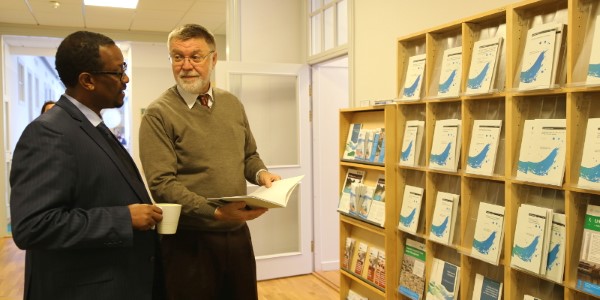AMCOW was established in 2002, with the role of shaping the Pan-African agenda on water. Its mandate is to provide political leadership, strategic direction, advocacy, and coordination mechanisms to water players on the continent. The Executive Committee of Ministers meet every year, and every two years the Governing Council gather, bringing together the 54 countries of Africa to decide on the direction and policies on water and sanitation issues.
“During the past 15 years, AMCOW has achieved a lot – all the high level agendas and policy declarations such as the Sirte Declaration in 2004, which brought focus on how to use water for food production and industrial development. This was a key piece of direction. It also produced commitments like the Sharm el-Sheikh Declaration committing to accelerate implementation of MDGs on water and sanitation, and there is the eThekwini Declaration, where African countries realized that much effort is put on water supply and management of water resources, but very little on sanitation. A decision was taken to also put emphasis on sanitation and invest resources in this,” says Kanangire.
WACDEP – a Flagship Programme
Since the start, AMCOW has joined forces with GWP on several programmes and projects. One is the Water, Climate and Development Programme (WACDEP), where GWP carried out the implementation. Kanangire wasn’t personally involved in developing WACDEP – he had other roles at the time and only joined AMCOW in September 2016 – but he acknowledges its importance and says it is something that AMCOW wants to continue building on:
“It is one of the flagship programmes we have in collaboration with GWP. WACDEP has contributed to bringing forward the climate change adaptation mechanisms, and the need to take these into account when planning developmental activities. This was a component that was mostly neglected in the past. In addition, for instance in the Kagera area between Rwanda and Burundi, there has been some tangible action which translated into reality in a project in the Cyohoha region. Climate change initiatives and mitigation measures were undertaken, and I think this is powerful to use when you are upscaling, because once you have result on smaller scale, this can be used to show that you can also get result in other areas,” says Kanangire, adding that climate change is a priority area for AMCOW.
“Climate change is something that we need to take aboard, mainly when we are talking about infrastructure development – such as dams for hydropower generation, but also smaller infrastructure projects that allow our countries to attain water security. All of those need to consider climate change issues. We are talking about changing how we look at land management to increase productivity – considering climate change issues so that whatever you undertake is in line and takes into account adaptation and resilience measures,” says Kanangire.
“At AMCOW, we are very interested in using these achievements to build a set of lessons, which can be shared with regions where a project didn’t work. We can use that knowledge to inform policy-making on water and climate change measures. We can also move towards risk management, which is an area that Africa needs to improve, to have measures to reduce the impact of various catastrophes that have happened on the continent.”
Achieving the SDGs
One of the key discussions at this moment, for both GWP and AMCOW, is around the Sustainable Development Goals (SDGs). Specifically, SDG6, which targets water and sanitation – and how to best support this goal successfully.
“The AMCOW Council of Ministers have approved a Priority Action Programme (PAP) which outlines the key elements that Africa should put resources on to attain the SDGs, especially SDG6, so that Africa can have tangible results and success. We need to make sure the PAP doesn’t become just another document on the shelf, but find out what partners we need to bring in, so that we can come up with concrete proposals where investors can chip in and help achieve the SDGs,” says Kanangire.
GWP can support AMCOW in this work, says Kanangire, because GWP has the kind of solid knowledge and information at the country level that is needed to support policy and decision making. “GWP’s expertise can be used by AMCOW to structure its own knowledge management system and dissemination,” says Kanangire.
There is a lot of work ahead, but Dr Kanangire says that he is hopeful in his approach – largely thanks to strong support and political will from the African ministers and their technical teams. Kanangire says his biggest challenge is how to plate up the big amount of issues that need to be addressed.
“Because we have many issues, I would even say we have problems. How do we work to have solutions in the little time we have? This is compounded by the capacity of the continent; in terms of human capacity, institutional capacity to undertake the number of programmes and projects we need. We need thinkers, we need implementers, we need institutions that are well designed and strong enough to steer the implementation and keep at high level of effectiveness, efficiency, and accountability. It is the complexity of the situation which makes it difficult to put all the pieces together and move forward in a coherent way. But I am hopeful.”
Top photo: GWP Executive Secretary Rudolph Cleveringa shows Dr Canisius Kanangire the GWP library.

